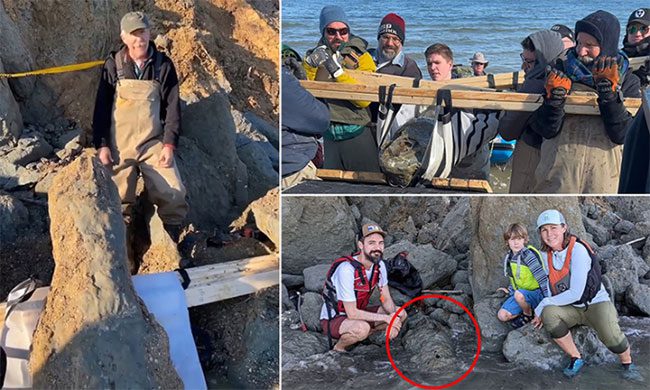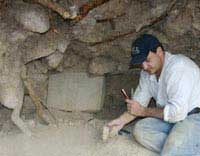Archaeologists have discovered the giant fossilized skull of a prehistoric baleen whale on Matoaka Beach in Calvert County, Maryland.

The giant whale skull fossil excavated on Matoaka Beach. (Photo: Calvert Marine Museum).
Cody Goddard, a paleontology enthusiast from Pennsylvania, was searching for shark teeth with his wife and son on Matoaka Beach in Chesapeake Bay, Maryland, when he noticed an unusual skull protruding from the sediment. This discovery was made back in October of last year, but due to the size of the specimen and the hard sediment surrounding it, they took more than two months to carefully excavate it from the beach, AFP reported on January 19.
According to the Calvert Marine Museum, this is the most complete whale skull fossil ever excavated in the area. It measures 1.7 meters long, 46 centimeters wide, and weighs up to 295 kilograms.
Paleontology curator Stephen J. Godfrey of the museum noted that the weight of the fossil primarily comes from the sediment that formed around the skull, rather than the skull itself.
“In a way, the sediment created a tomb that buried and preserved the skull for millions of years, leading to today’s discovery,” Godfrey said. “It feels like we just won the World Paleontology Cup.”
Radiocarbon dating indicates that the specimen is approximately 12 million years old, belonging to a species of baleen whale that lived during the Miocene epoch. Similar to modern baleen whales such as the humpback whale, it used a special baleen plate resembling a sieve to filter food from seawater, rather than using teeth to chew prey.
Godfrey further mentioned that they do not yet know specifically which prehistoric baleen whale species this is, but this information may be revealed once the fossil is transferred to the laboratory of the Calvert Marine Museum, where specialized tools will be used to remove the sediment surrounding the skull, a process expected to take several months.





















































